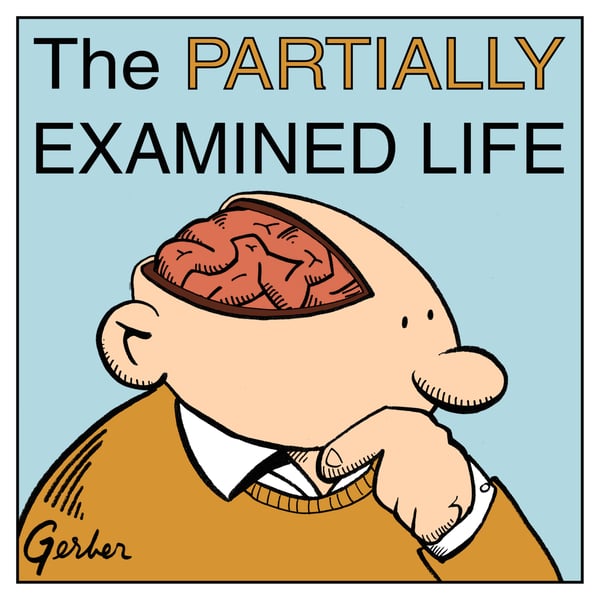Ep. 350: Rorty on Justification and Essentialism (Part Two)
The Partially Examined Life Philosophy Podcast
Mark Linsenmayer
4.6 • 2.3K Ratings
🗓️ 23 September 2024
⏱️ 52 minutes
🧾️ Download transcript
Summary
Concluding on "Universality and Truth" from Richard Rorty's Pragmatism As Anti-Authoritarianism. It it coherent to simply not have a theory of truth? Rorty claims that he's not a relativist; he's just avoiding some useless parts of philosophy that just cause problems, including inculcating the respect for a non-human absolute, and this attitude undermines democracy.
Get more at partiallyexaminedlife.com. Visit partiallyexaminedlife.com/support to get ad-free episodes and bonus content.
Sponsor: Check out the Constant Wonder podcast.
Transcript
Click on a timestamp to play from that location
| 0:00.0 | And this is the partial examine life episode 350 part 2. We've been doing our final episode on Rorte's pragmatism as anti-authoritarianism, |
| 0:15.8 | because even though there's more to this book about ethics, we wanted to just, it's enough to cover this |
| 0:21.0 | epistemological stuff. |
| 0:22.0 | You mentioned in your last comment in part one, |
| 0:24.6 | Wes, this thing that is actually the thesis perhaps of the first essay that we read |
| 0:30.4 | universality in truth, lectures three and four, which is that it's not truth that |
| 0:36.7 | we should be shooting for. |
| 0:38.1 | It's not that there's a universal desire for truth and that's what all conversation is converging on and all investigation is converging on. |
| 0:47.0 | It's about justification that we do have a universal desire to justify ourselves, but that, according to Rorty, has to be context dependent, right? |
| 0:58.9 | We justifying ourselves to a particular audience, |
| 1:04.0 | you know, given that we have some particular |
| 1:06.7 | worries that we want to have addressed or something like that, |
| 1:10.0 | not to all possible future audiences, transcendent justify ourselves to God. |
| 1:15.0 | Yeah, so this brings us to maybe the most relevant part to look at is the section 3 truth and |
| 1:20.9 | justification to begin with on page 51, PDF page 87. But the idea is that, right, so he wants to, for obvious reasons, reduce true to ways of talking about justification. |
| 1:36.0 | So true will be a way of talking, creating a contrast with justification, and there's a reason |
| 1:42.4 | for that, right? So we know about this contrast between. with justification. |
| 1:47.0 | from Gettyier, for instance, we can say, is justified, |
| 1:51.3 | and yet it is false. we need that kind of contrast they can't just |
| 1:56.0 | collapse into each other and for him he wants to cash this out in terms of the use of true |
| 2:02.0 | the word true as a cautionary use which is to say we think this we believe |
| 2:10.3 | this now but there may be new objections later on. There may be new data or new theories. |
... |
Please login to see the full transcript.
Disclaimer: The podcast and artwork embedded on this page are from Mark Linsenmayer, and are the property of its owner and not affiliated with or endorsed by Tapesearch.
Generated transcripts are the property of Mark Linsenmayer and are distributed freely under the Fair Use doctrine. Transcripts generated by Tapesearch are not guaranteed to be accurate.
Copyright © Tapesearch 2025.

